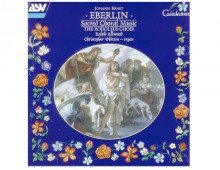Thomas Tallis
£13.50
£13.50 Add to cart

Latin and English motets & anthems by the accomplished polyphonist.
Artist: The Rodolfus Choir
Conductor: Ralph Allwood
Label: Herald (Released: December 2004)
Few, if any, composers of the sixteenth century can boast such a variety of musical styles and genres as Thomas Tallis. His diverse yet strikingly individual voice was a product of an outstanding musical imagination combined with the extraordinary historical context in which he lived. His working life spanned the reign of four monarchs, each preferring a drastically different flavour of Christian worship from his or her predecessor.
1. Sancte Deus
2. Suscipe quæso Domine
3. Salvator mundi
4. Miserere nostri
5. In ieunio et fletu
6. If ye love me
7. Loquebantur variis linguis
8. Candidi facti sunt
9. O Lord, give thy Holy Spirit
10. O nata lux
11. Videte miraculum
12. Verily, verily
13. O salutaris hostia
14. O sacrum convivium
15. Thou wast, O God
16. Jesu, Salvator sæculi
17. Magnificat (Dorian)
18. Nunc dimittis (Dorian)
19. Te lucis ante terminum
The 400th anniversary of Tallis's death has been overshadowed by the Tippett centenary, yet the Tudor polyphonist is arguably the greater composer. Ralph Allwood and The Rodolfus Choir drawn from young singers of both sexes who have participated in Allwood's summer schools have assembled a programme of his finest motets, anthems and hymns, without resorting to Spem in alium. Their radiant reading ofVidete miraculum is a technical triumph, but the most moving performance is of Thou wast, O God: an intimate hymn, and the inspiration for Vaughan Williams's Fantasia on a Theme by Thomas Tallis. Anna Picard, Independent on Sunday
The choir are young sounding, performing Tallis’s music with a concentrated, passionate intensity which impressed me. The sopranos are recognisably female but sing with a lovely, bright, forward, boyish tone … The Magnificat and Nunc Dimittis in the Dorian mode were written for Edward’s reign, for the newly instituted service of Evening Prayer. Like his anthems from the period, the settings are economical and clarity of text is paramount. This is one of the earliest paired settings of Magnificat andNunc Dimittis and is beautifully crafted. The group’s performances highlight the beautiful simplicity of these pieces … [all pieces] are lovely, well crafted performances by a choir of young choristers. This youth brings the advantages of clarity of tone and texture. Robert Hugill, MusicWeb International




 Mater, Ora Filium
Mater, Ora Filium A Choral Christmas
A Choral Christmas Monteverdi Vespers of 1610
Monteverdi Vespers of 1610 Gottwald Choral Arrangements
Gottwald Choral Arrangements Among the Leaves So Green
Among the Leaves So Green …the flowers have their angels Paul Mealor Benjamin Britten
…the flowers have their angels Paul Mealor Benjamin Britten Go, song of mine
Go, song of mine @RodolfusChoir
@RodolfusChoir